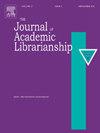Becoming a leader in AI literacy instruction by not reinventing the wheel
IF 2.3
3区 管理学
Q2 INFORMATION SCIENCE & LIBRARY SCIENCE
引用次数: 0
Abstract
Libraries are at a critical moment to lead in AI literacy, but success doesn't demand starting from scratch. By building on familiar frameworks for information literacy, outreach, and instructional design, libraries can quickly and effectively meet the challenges of generative AI. This article showcases how one research-intensive university library leveraged existing strengths—through AI-focused guides, workshops, grants, and cross-campus partnerships—to embed AI literacy across its academic community. Rather than reinventing the wheel, the library expanded proven methods to support ethical, critical, and informed engagement with AI technologies. This case study offers a practical, scalable model for any library seeking to empower users and stake a leadership role in the rapidly evolving AI landscape.
不做无谓的重复工作,成为人工智能素养教育的领导者
图书馆正处于引领人工智能素养的关键时刻,但成功并不需要从零开始。通过建立熟悉的信息素养、外展和教学设计框架,图书馆可以快速有效地应对生成式人工智能的挑战。本文展示了一家研究密集型大学图书馆如何利用现有优势——通过以人工智能为重点的指南、研讨会、赠款和跨校园合作伙伴关系——在其学术社区中嵌入人工智能素养。该图书馆没有重新发明轮子,而是扩展了经过验证的方法,以支持与人工智能技术进行道德、关键和知情的接触。本案例研究为任何图书馆提供了一个实用的、可扩展的模型,以寻求在快速发展的人工智能领域中赋予用户权力并发挥领导作用。
本文章由计算机程序翻译,如有差异,请以英文原文为准。
求助全文
约1分钟内获得全文
求助全文
来源期刊

Journal of Academic Librarianship
INFORMATION SCIENCE & LIBRARY SCIENCE-
CiteScore
5.30
自引率
15.40%
发文量
120
审稿时长
29 days
期刊介绍:
The Journal of Academic Librarianship, an international and refereed journal, publishes articles that focus on problems and issues germane to college and university libraries. JAL provides a forum for authors to present research findings and, where applicable, their practical applications and significance; analyze policies, practices, issues, and trends; speculate about the future of academic librarianship; present analytical bibliographic essays and philosophical treatises. JAL also brings to the attention of its readers information about hundreds of new and recently published books in library and information science, management, scholarly communication, and higher education. JAL, in addition, covers management and discipline-based software and information policy developments.
 求助内容:
求助内容: 应助结果提醒方式:
应助结果提醒方式:


